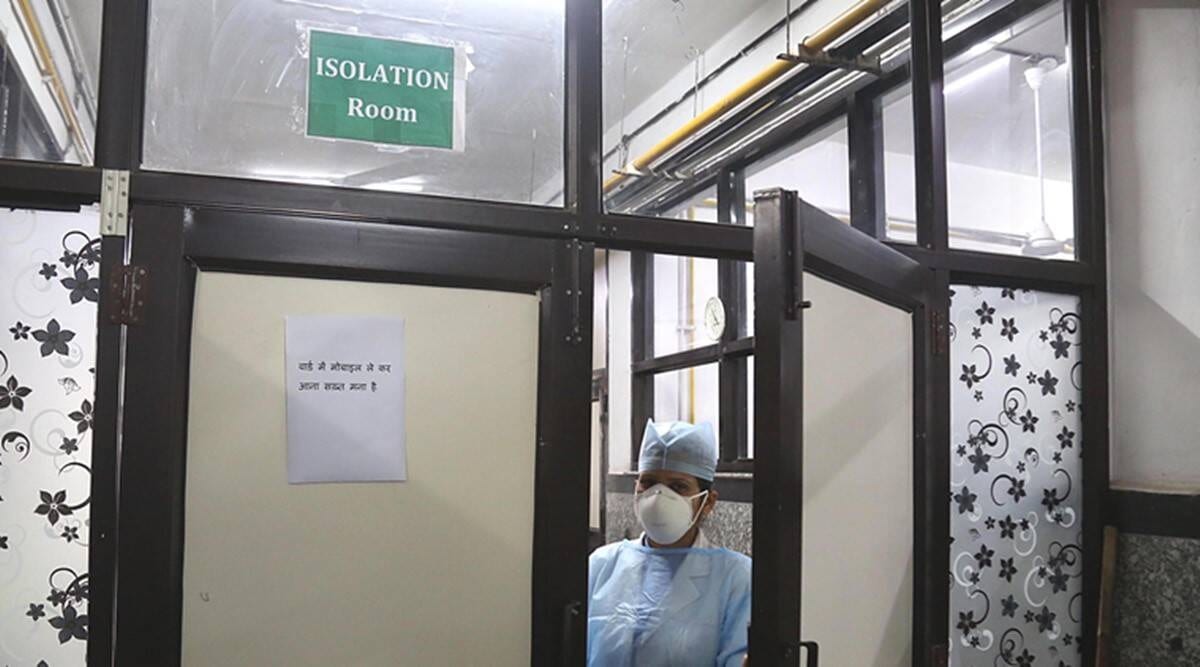 The presentation also noted that stigma led to "delayed reporting of cases" which affected "case management and prevention measures". (Representational)
The presentation also noted that stigma led to "delayed reporting of cases" which affected "case management and prevention measures". (Representational)Covid-19 patients in home isolation in Punjab will no longer have to suffer the fear and stigma of social isolation resulting from posters affixed at the entrance of their homes. Punjab Chief Minister Amarinder Singh on Friday reversed his government’s earlier decision of putting posters outside the houses of Covid patients under home isolation or quarantine. Posters where already affixed may be removed, he directed.
“The move is aimed at minimising the stigma resulting from the affixing of such posters at the front doors of such patients, thus also negating the fear of testing,” said the Chief Minister, once again appealing to the people to come out for early testing, diagnosis and treatment of the infection.
In a related development, Punjab government on Friday organised a video conference to dispel the notion of stigma and discrimination against people testing positive for coronavirus. The measures mooted during the virtual conference were amplifying correct vocabulary like “people who have Covid-19” instead of “Covid-19 cases” and “Covid-19 victims”, share positive stories of those who have recovered from the infection, don’t label any individual group or area for the spread of Covid-19, don’t spread misinformation/rumours were among series of measures mooted in a video conferencing.
Experts from United Nations Development Program and World Health Organisation were part of the orientation on anti-stigma and discrrimination drive. Among those who attended the conference were frontline health workers, state health department officials and administrative officials.
In a presentation during the conference, it was noted that effects of stigma and discrimination included “increased sense of emotional isolation, feeling of guilt and anxiety, lack of self-esteem and confidence and worsening of pre-existing psychiatric illness such as depression”.
Due to stigma and discrimination, the presentation noted people were “concealing symptoms”, showing “hesitancy in seeking medical care” and were “not adhering to interventions like home quarantine”.
It also noted that due to attached stigma and discrimination, there was “Ostracisation of healthcare workers and others involved in Covid-19 management”.
The presentation also noted that stigma led to “delayed reporting of cases” which affected “case management and prevention measures”.
“Despite precautions, if a person contracts Covid-19, it is not his/her fault. Anyone is susceptible to contracting the disease. No one needs to be blamed. In situations of distress, the patient and family need support and cooperation. Be a well wisher to those in isolation/quarantine and their families. Testing, isolation and quarantine are meant to protect the family and community… Celebrate persons who have recovered from Covid-19 as winners.,” the presentation argued.
Further to fight stigma, it pointed out that frontline healthcare workers, volunteers, community leaders etc. should be supported.
Punjab’s nodal officer for Covid-19, Dr Rajesh Bhaskar, said: “The conference was aimed at dispelling the stigma and notion that it was not anyone’s fault if that person tests positive. It also focused on arranging supplies to the person or family in case they test positive and not discriminating with them.”
Dr Bhaskar also said that it was unfortunate that there were rumours that organs of people were being taken out during the pandemic, which was resulting in people avoiding testing.
Block Extension Educator (BEE) at Sursingh Community Health Centre in Tarn Taran district, Naveen Kalia, who attended the VC, said, “It is the need of hour to dispel all such kinds of rumours among the public. Being a part of the mass media wing of the Health Department, we will make all efforts to accomplish this task.”
Meanwhile, while announcing the move to not put posters outside the houses of Covid patients, Chief Minister Amarinder Singh stated, “The psychological trauma which patients were seen suffering as a result of these posters, which were meant to protect neighbours and others of such patients, was defeating the very purpose. These posters were actually found scaring people away from testing.”
He added: “The undesirable and unintended consequences of these posters included social isolation and stigma, leading to anxiety and prejudices against the patients. People would refrain from getting tested to avoid this stigma instead of extending support and community to the patients and their families, which had prompted a rethink on the decision of affixing posters.”
The Chief Minister urged people to continue taking all necessary precautions and follow all applicable guidelines for home isolation/quarantine notwithstanding the removal of the posters. “Violation of these guidelines is a punishable offence under Disaster Management Act, Epidemic Diseases Act and Indian Penal Code,” he pointed out.
Giving a call for collective fight against the pandemic, the Chief Minister said state government was “committed to ensuring the health and well-being of every person, and the community had an important role to play in this fight. They can do so by providing support, motivating and encouraging behavioural change that can help avoid the transmission of the disease and in preventing any rumours about the disease or its treatment.”
Punjab government had recently allowed home isolation for asymptomatic/mildly symptomatic Covid patients, who did not suffer from any co-morbidities, as per the protocol of the Ministry of Health and Family Welfare and recommendations of Indian Council of Medical Research.
“In fact, as the number of cases in the state continued to rise, home isolation for these patients was actively advocated and facilitated, with constant monitoring by local health authorities. The monitoring was aimed at ensuring the best possible care for such patients in terms of environment, diet etc. and also to make sure that Level 3/Level 2 beds were available for those who needed them,” said the CM.
Dr Bhaskar said out of more than 15,000 active cases in the state, around half of them were currently in home isolation.